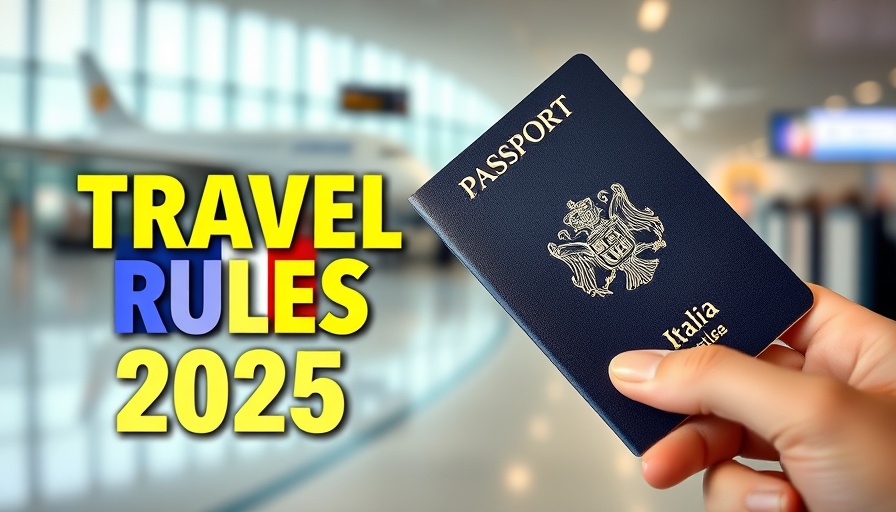
The Big Shift in European Travel: What You Need to Know
As we approach 2025, the landscape of travel in Europe is transforming dramatically. With new rules and regulations rolling out from digital border systems to updated tourist taxes, international travelers need to adjust their expectations and plans. This article dives into what these changes mean for you, whether you're considering a short getaway or an extended stay.
In 'New Rules for Traveling to Europe in 2025: Everything You Must Know!', the discussion dives into the upcoming travel regulations, exploring key insights that sparked deeper analysis on our end.
Digitizing the Entry Experience: The New Border Systems
Imagine stepping off a plane and instead of a border officer stamping your passport, you simply walk up to a digital scanner. This new entry-exit system (EES) will usher in a new era of border control when implemented in 2025. Through facial recognition and fingerprint scanning technology, this revolutionary approach ensures that every entry and exit is accurately recorded, eliminating the guesswork surrounding your stay in Europe.
For travelers from countries exempt from visas, such as the United States and Canada, the electronic travel authorization system (ETS) comes into play. For a small fee of €7, travelers will submit their details online prior to their trips, ensuring a smooth entry experience. Importantly, this approval lasts for three years, offering both convenience and travel flexibility.
Traveling to the UK? Expect New Requirements
Starting January 8th, 2025, travelers from countries like Australia and Canada will also need to secure an electronic travel authorization (ETA) to enter the UK. This new system, which costs £10, emphasizes security checks to streamline border experiences. With the ETA linked to your passport, airlines can verify your status quickly, making travel simpler and more efficient. As an added twist, EU citizens will also be required to obtain an ETA shortly thereafter, highlighting the growing interconnectedness and regulations around travel to the UK.
The Expanding Schengen Area: What It Means for Road Trips
One of the most exciting developments is the expansion of the Schengen Zone on January 1st, 2025, when Bulgaria and Romania join. This represents a huge boon for tourists, particularly those who enjoy road trips. Travelers can explore Eastern Europe without interruptions from border checks, enabling spontaneous adventures from Hungary through Romania and Bulgaria.
Not only does this expansion promise ease of travel, but it's also a significant opportunity for boosting tourism in these countries. Local businesses will benefit from increased travel traffic, resulting in more flights, train routes, and direct bus services. With vibrant cultures and breathtaking landscapes, Bulgaria and Romania will surely be on the maps of European explorers.
Understanding the Financial Implications: New Tourist Taxes
Travelers will need to factor in new and increased tourist taxes, with leading cities introducing fees to combat over-tourism. Venice is spearheading this trend, charging visitors up to €10 for single-day visits starting April 2025, based on a dynamic pricing model. This means travelers should be strategic about their trip dates to mitigate costs.
Additionally, Greece is increasing its tourist tax significantly; for instance, daily rates could rise up to €8 during peak seasons. Portugal is also following suit with a hiking trail fee in Madeira. While these fees may seem minimal on their own, they can add up, especially for families planning longer vacations.
Emerging Opportunities: Residence and Work Regulations
2025 will see important changes not just for travel but also for residency. Greece is innovating its Golden Visa program by allowing residency through investments in startup ventures—signifying a shift towards innovation rather than traditional real estate investment. Compliance, however, is critical: investors must create at least two jobs within the first year, fostering local economic growth.
Spain's approach to Golden Visas is also under review, with future potential changes that may affect many aspirations to live and work in Europe. Similarly, France will require proof of language proficiency for residency permits, pushing future residents to integrate into local culture authentically. Learning French will soon likely become essential for those wishing to establish a long-term life in France.
What All These Changes Mean for You
With a host of new travel regulations and policies set to take effect in 2025, it's imperative for travelers to stay informed and plan ahead. Understanding how these changes impact your budget, travel itinerary, and long-term residence aspirations can help ensure smoother travels and fulfill dreams of experiencing the richness of European culture.
You may want to start looking into the digital application processes for visas or travel authorizations, and making notes of potential tourist taxes to budget for. And if the idea of visiting more countries without border hassle excites you, make sure to plan a road trip through Eastern Europe!
As the world keeps turning and new challenges and opportunities emerge, staying updated on the evolving travel landscape becomes critical for any savvy traveler. Happy planning, and remember to embrace the changes for a remarkable journey ahead.
 Add Row
Add Row  Add
Add 




 Add Row
Add Row  Add
Add 

Write A Comment